Here’s how you can make an easy shift to a plant-based diet
People become vegetarians for many reasons: To reduce their carbon footprint, to be cruelty-free, to improve their gut health, to prevent chronic illnesses and to get glowing skin. Studies suggest that more people are adopting a plant-based lifestyle each year, which two-thirds of U.S. consumers choose to eat less meat.
Going vegetarian has multiple health benefits. You can expect lower cholesterol, body mass index and blood pressure as well as a decrease in chronic health conditions. Plant-based foods are packed with sufficient fibers, essential vitamins and minerals and a variety of antioxidants, which help build immunity, combat inflammation and feed your gut with probiotics. Plus, plant protein is linked with improved insulin regulation, which will lower your risk of type 2 diabetes. According to one study, ample amounts of foods and vegetables in your diet can help reduce the risk of heart disease by 42 percent.
Now that we know the benefits of a plant-based diet, let's discuss an easy way to make the shift from animal produce to vegetables and nature-based foods.
Cut back on one thing first.
 IMAGE COURTESY: https://www.pexels.com/@monserratsoldu
IMAGE COURTESY: https://www.pexels.com/@monserratsoldu
Start by eliminating red meat. Then in two weeks, stop consuming poultry and fish. And then so on and so forth.
Become a part-time vegetarian.
Aim to ditch animal products for three days in your first week. After three or four weeks, slowly decrease the number of your meat-eating days.
Introduce more vegetables.
 IMAGE COURTESY: https://www.pexels.com/@enginakyurt
IMAGE COURTESY: https://www.pexels.com/@enginakyurt
It is important to be diverse and try new alternatives when shifting to a new lifestyle. Try eating vegetables outside of your salads. Order mushrooms, peppers and onions as your pizza topping, or stuff your dumpling with veggies instead of meat.
Eat local.
Being a vegetarian is fairly simple—you don’t have to look for any fancy varieties, just grab whatever your local farmer’s market is offering. The foods grown near your house have spent less time in transportation, which means they are fresh and rich in nutrients, like vitamin C that is especially unstable.
Choose plant-based protein.
 IMAGE COURTESY: https://www.pexels.com/@martabranco
IMAGE COURTESY: https://www.pexels.com/@martabranco
Meat isn’t as important for humans as we may assume. Seeds, nuts, tofu, beans, milk, quinoa and edamame are great protein sources. Natural soy products are ideal meal replacements.
Get creative.
Vegetarian food doesn’t have to be boring. There are hundreds of hearty and healthy options to choose from—falafel sandwiches, spinach lasagna, mushroom risotto, veggie burgers, vegan chili and zucchini meatballs among others.
Be easy on yourself.
 IMAGE COURTESY: https://www.pexels.com/@daniel-reche-718241
IMAGE COURTESY: https://www.pexels.com/@daniel-reche-718241
If you give in to your temptation, don’t beat yourself up. Eating one bite of your cheeseburger or pepperoni pizza is fine. Do your best to follow a plant-based diet but remember every change takes time and patience.
Reminders are important.
You turned vegetarian for a reason, whether it was against animal cruelty or for health reasons. The trick to keep following a plant-based diet is to reinforce positive thoughts to stay determined. Read blogs, articles and magazines about vegetarianism and how it will impact your health and the environment.
To book a virtual consultation with me, click here.
FEATURED IMAGE COURTESY: <a href="https://www.freepik.com/photos/food">

